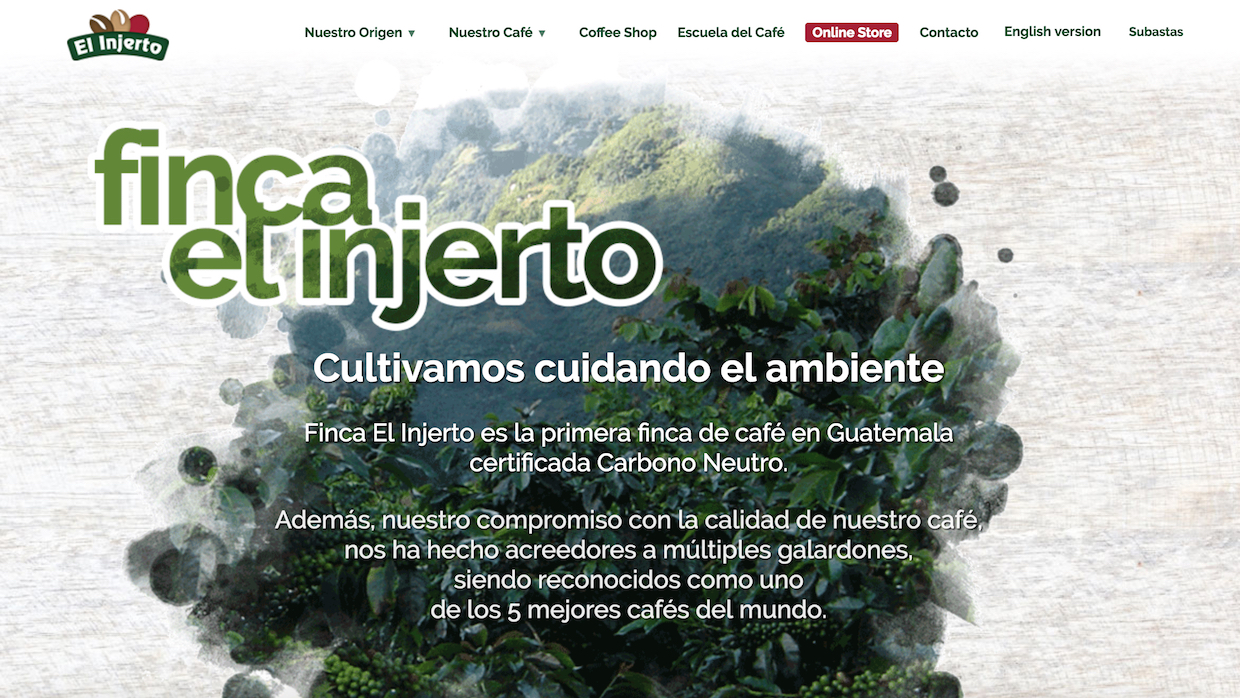
Screenshot of the Fina El Injerto homepage. Finca El Injerto was one of only two farms out of 45 whose homepage appeared on the first page of Google search results in the TTC analysis.
The team at the Transparent Trade Coffee has has dug deep into the web to unearth insights regarding the online presence of some of the world’s most renowned coffee farms.
The group found that, for the most part, individual farms and farming organizations are primarily found online through third-party sources such as roasters, importers or media outlets — whether through social media channels or individual online properties such as company web pages.
“When it comes to social media, it is much easier to find specialty coffee farms by going through roasters or importers,” the group, based at Emory University in Atlanta, wrote in its latest TTC Insight report. “This is both good and bad. It is good in the sense that other companies are working to build a farm’s brand and foster connections with potential customers. It is bad in the sense that these market identities and relationships are captured by others working further down the coffee supply chain. It is also bad in that importers and roasters have weaker incentives to continue promoting and connecting farms after the winning coffees are sold out. All of this limits the economic benefits that flow back to specialty coffee farms.”
For the survey, the TTC team used Google searches in an attempt to discover the online presence of 45 specialty coffee farms that have received more than one top-three finishes in the long-running Cup of Excellence coffee quality competition over the past 10 years in Latin America. The group then analyzed search results after entering the name of the farm, the country of origin and the name of the winning coffee.
It is worth noting that the results analyzed were in English, undoubtedly affecting Google’s algorithms, but also making for a more targeted analysis of web presences in key premium export markets. In other words, the analysis is geared toward how buyers in places like the United States may discover information about individual farms.
A few of TTC’s most illuminating findings:
- Only two of the winning farms (4 percent) have websites and Facebook pages that appear on the first Google search page.
- Three farms (7 percent) have websites but no Facebook pages, while four farms (9 percent) have Facebook pages but no websites.
- Search results for winning coffees appeared in the highest numbers on the websites of of coffee roasters, followed by pages from “other sources” such as news media, then by pages from importers.
“If specialty coffee farmers continue to allow roasters and importers be the only ones telling their stories, they will continue to occupy the commodified back stages of lucrative market-based performances that play out further down the value chain,” TTC wrote in its analysis. “From these invisible positions, they will miss opportunities to help importers and roasters tell more effective stories, and to curate relationships with the range of current and potential buyers that are necessary to maximize the economic returns to their ongoing investments in coffee quality.”
Naturally, such opportunities will require the breaking down of a number of preventive barriers related to language, time and digital resources.
Nick Brown
Nick Brown is the editor of Daily Coffee News by Roast Magazine.
Comment
1 Comment
Comments are closed.






The research presents the cold truth and truly LOTS could be discuss about it. After spending the last 6 years teaching web development and social media (as volunteer) to Fair Trade organizations in nearly 40 countries of the great south, all I can say is that artisans, farmers and their organizations truly need lots of guidance, tuition, love, patience and follow up so they reach a true Digital Sovereignty. It has been the best years of my life as a nomad rural teacher and still help to maintain countless social media accounts and +100 websites worldwide. With that said, more solidarity and rural IT projects needed if we want farmers to truly empower themselves so they take control over their online identity, communications and online strategies. We all do our part to help where it is needed and I’m already working on a sweet digital revolution to add a little bit more of IT help so farmers are more visible and their voices better heard worldwide. It is a long process but we are all getting there one step at the time.